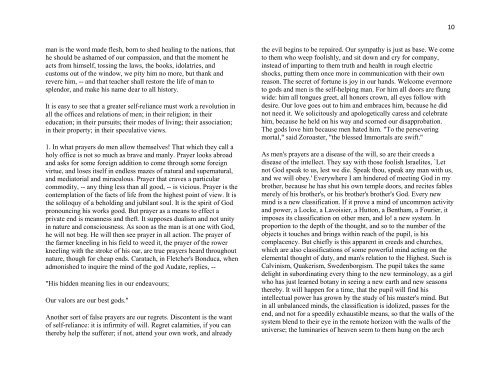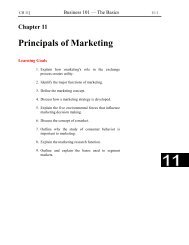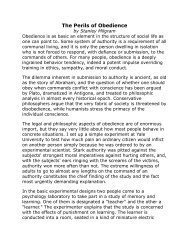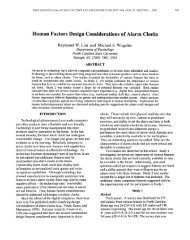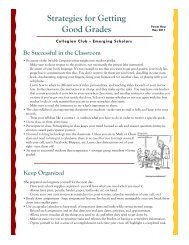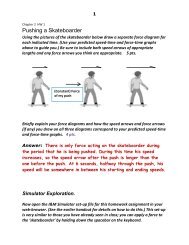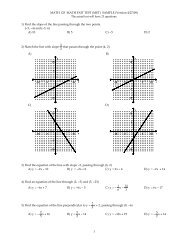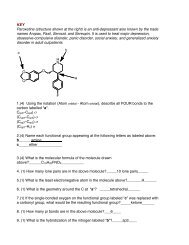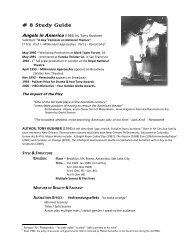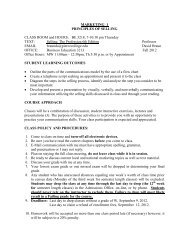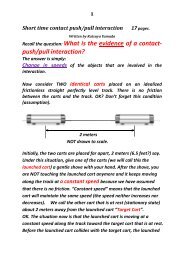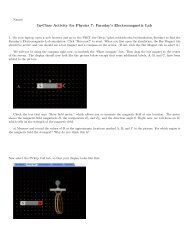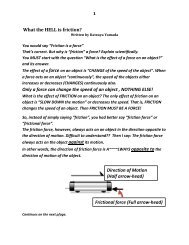Self-Reliance - Faculty.piercecollege.edu
Self-Reliance - Faculty.piercecollege.edu
Self-Reliance - Faculty.piercecollege.edu
Create successful ePaper yourself
Turn your PDF publications into a flip-book with our unique Google optimized e-Paper software.
man is the word made flesh, born to shed healing to the nations, that<br />
he should be ashamed of our compassion, and that the moment he<br />
acts from himself, tossing the laws, the books, idolatries, and<br />
customs out of the window, we pity him no more, but thank and<br />
revere him, -- and that teacher shall restore the life of man to<br />
splendor, and make his name dear to all history.<br />
It is easy to see that a greater self-reliance must work a revolution in<br />
all the offices and relations of men; in their religion; in their<br />
<strong>edu</strong>cation; in their pursuits; their modes of living; their association;<br />
in their property; in their speculative views.<br />
1. In what prayers do men allow themselves! That which they call a<br />
holy office is not so much as brave and manly. Prayer looks abroad<br />
and asks for some foreign addition to come through some foreign<br />
virtue, and loses itself in endless mazes of natural and supernatural,<br />
and mediatorial and miraculous. Prayer that craves a particular<br />
commodity, -- any thing less than all good, -- is vicious. Prayer is the<br />
contemplation of the facts of life from the highest point of view. It is<br />
the soliloquy of a beholding and jubilant soul. It is the spirit of God<br />
pronouncing his works good. But prayer as a means to effect a<br />
private end is meanness and theft. It supposes dualism and not unity<br />
in nature and consciousness. As soon as the man is at one with God,<br />
he will not beg. He will then see prayer in all action. The prayer of<br />
the farmer kneeling in his field to weed it, the prayer of the rower<br />
kneeling with the stroke of his oar, are true prayers heard throughout<br />
nature, though for cheap ends. Caratach, in Fletcher's Bonduca, when<br />
admonished to inquire the mind of the god Audate, replies, --<br />
"His hidden meaning lies in our endeavours;<br />
Our valors are our best gods."<br />
Another sort of false prayers are our regrets. Discontent is the want<br />
of self-reliance: it is infirmity of will. Regret calamities, if you can<br />
thereby help the sufferer; if not, attend your own work, and already<br />
the evil begins to be repaired. Our sympathy is just as base. We come<br />
to them who weep foolishly, and sit down and cry for company,<br />
instead of imparting to them truth and health in rough electric<br />
shocks, putting them once more in communication with their own<br />
reason. The secret of fortune is joy in our hands. Welcome evermore<br />
to gods and men is the self-helping man. For him all doors are flung<br />
wide: him all tongues greet, all honors crown, all eyes follow with<br />
desire. Our love goes out to him and embraces him, because he did<br />
not need it. We solicitously and apologetically caress and celebrate<br />
him, because he held on his way and scorned our disapprobation.<br />
The gods love him because men hated him. "To the persevering<br />
mortal," said Zoroaster, "the blessed Immortals are swift."<br />
As men's prayers are a disease of the will, so are their creeds a<br />
disease of the intellect. They say with those foolish Israelites, `Let<br />
not God speak to us, lest we die. Speak thou, speak any man with us,<br />
and we will obey.' Everywhere I am hindered of meeting God in my<br />
brother, because he has shut his own temple doors, and recites fables<br />
merely of his brother's, or his brother's brother's God. Every new<br />
mind is a new classification. If it prove a mind of uncommon activity<br />
and power, a Locke, a Lavoisier, a Hutton, a Bentham, a Fourier, it<br />
imposes its classification on other men, and lo! a new system. In<br />
proportion to the depth of the thought, and so to the number of the<br />
objects it touches and brings within reach of the pupil, is his<br />
complacency. But chiefly is this apparent in creeds and churches,<br />
which are also classifications of some powerful mind acting on the<br />
elemental thought of duty, and man's relation to the Highest. Such is<br />
Calvinism, Quakerism, Swedenborgism. The pupil takes the same<br />
delight in subordinating every thing to the new terminology, as a girl<br />
who has just learned botany in seeing a new earth and new seasons<br />
thereby. It will happen for a time, that the pupil will find his<br />
intellectual power has grown by the study of his master's mind. But<br />
in all unbalanced minds, the classification is idolized, passes for the<br />
end, and not for a speedily exhaustible means, so that the walls of the<br />
system blend to their eye in the remote horizon with the walls of the<br />
universe; the luminaries of heaven seem to them hung on the arch<br />
10


